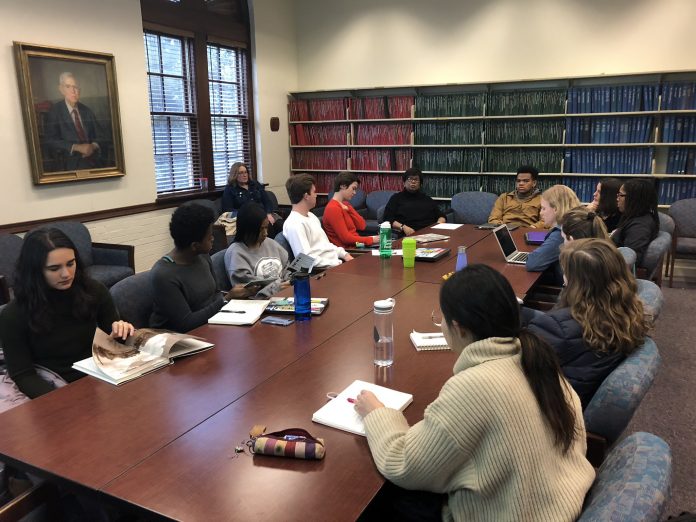This year, 10 years after the Lemon Project: A Journey of Reconciliation was established, the Project is entering a new chapter as it opens up its newest initiative — the Lemon Project Society — which will function as a student volunteer organization.
The team behind the Lemon Project, which was created to address the legacy of wrongs committed against African Americans by the College of William and Mary, including the College’s use of slave labor, is looking forward to continuing this work with increased involvement of undergraduate students through the Society.
Those selected for the Society will contribute to the multifaceted Lemon Project as ambassadors focused on advertising, spreading awareness, supporting Lemon Project events, like Porch Talks, the Donning of the Kente and the Lemon Project Symposium, and committing to 10 hours of volunteer work each semester. Students will be selected via an online application, which will be accepted up until Feb. 9 at 5 p.m.
Lemon Project Administrative and Archival Assistant Sarah Thomas ’08 Ph.D. ’18 said that the project will help students cultivate skills in public speaking and digital curation.
“We also hope to provide students with tangible skills that they can use in their future,” Thomas said.
Lemon Project American Studies Graduate Assistant Ravynn Stringfield M.A. ’18 Ph.D. ’21 said she hopes that the Society will provide students with a framework for sharing information.
“I think one of our goals is to have something structured that students can participate in so that they can go back to their communities and spread the word about the Lemon Project,” Stringfield said.
“I think one of our goals is to have something structured that students can participate in so that they can go back to their communities and spread the word about the Lemon Project.”
Stringfield herself has worked closely with the Branch Out Alternative Break Program for the Lemon Project that is held each year during the weekend before classes begin in the spring. She often felt like students left the Branch Out trip lacking another outlet to engage with the Lemon Project, and she identifies this as a clear reason for the creation of the Society.
“I do a lot of work with the Branch Out Alternative Break students, and the first thing they ask me after the weekend is over is, ‘How can we get more involved with the Lemon Project? What can we do now that the weekend is over?’ Stringfield said. “And to be honest, we kind of fumbled with that question because we didn’t have anything structured for them to participate in.”
Angela Rose West ’20, a student site leader for the Lemon Project Branch Out trip, shared Stringfield’s sentiments.
“I think it’s great the Lemon Project is expanding student involvement — I have gone on the Branch Out trip with the Lemon Project twice now, and both times students wanted to stay connected and involved,” West said in a written statement. “This offers an excellent opportunity for the student body to contend with William and Mary’s fraught history with slavery and race.”
“I think it’s great the Lemon Project is expanding student involvement — I have gone on the Branch Out trip with the Lemon Project twice now, and both times students wanted to stay connected and involved. This offers an excellent opportunity for the student body to contend with William and Mary’s fraught history with slavery and race.”
Another important aspect of the Society is the opportunity it will give its members to take initiative and begin their own projects. Beyond being a part of Lemon Project events like their Annual Symposium, students should be able to bring their own ideas to the table.
“I’m sure that students will have their own projects that they want to pursue that bring them to the Lemon Project Society in general,” Stringfield said.
As both Thomas and Stringfield acknowledge, creating the Society will be a learning process that will evolve as members bring new ideas for how it should function. According to Thomas, the whole team at the Lemon Project is excited for the possibilities of the Society.
“We wanted to have something that was a real organization where we can be a group together,” Thomas said. “We want to create a sense of community — that’s part of our goal at the Lemon Project.”
Stringfield said that the Society recognizes the strength of the work already being done by the Lemon Project while creating a way to engage students and give them a voice.
“I think the Lemon Project is doing a good job of communicating our goals and our research to faculty members, graduate students and community members, but I sometimes feel like undergraduates may not know the entirety of what we do,” Stringfield said. “And I think the best way to rectify that is to make sure that they’re involved in our research, in our events, in the planning. I think that first-hand experience is really important.”

